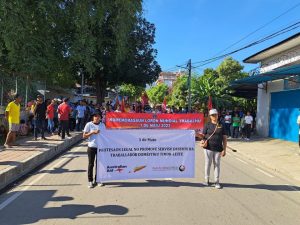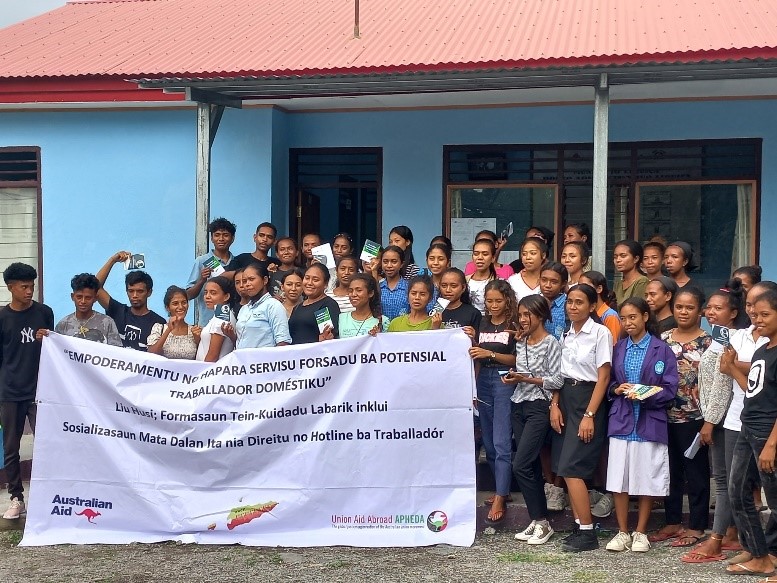According to the United Nations, Timor-Leste is considered one of the world’s least developed countries. Despite great gains made since the restoration of Independence in 2002, a weak oil-dependent formal economy and low urbanisation rate have made it difficult for many to find decent work. Demographic factors have made it even harder to find a job, especially for young people and women. Following a post-independence baby boom, Timor Leste has one of the youngest populations in the world, with 65% of people under the age of 30. Sixty percent of working women in Timor Leste are employed informally, often grouped in the least secure and lowest-paid positions. More than 30,000 of these workers are employed as “housekeepers, home-based social workers and related services” – over 90% are women.
They are among almost 76 million domestic workers worldwide who earn incomes as cleaners, cooks, nannies, and care workers in private households. Roughly 75% of these workers are women, many of who travel to cities from rural areas or across borders to make ends meet. This work is challenging, and notoriously vulnerable to exploitation, with domestic work characterised by long hours, lower wages and fewer benefits and protections than other types of work. Working in private homes, which tend to be extremely difficult to monitor or regulate, they are particularly vulnerable to exploitation, harassment and in some cases, violence.
Despite these challenges, as a Timorese middle class emerges, domestic work is seen as an increasingly important source of income for young women, especially those from rural areas with limited educational backgrounds and socio-economic opportunities. However, as in many other countries, their vulnerability is compounded by a lack of legal and social protections, with domestic work excluded from Timor Leste’s labour code. While formal-sector workers are eligible for a minimum wage of US$115 per month and a 44-hour working week with provisions for overtime pay, national holidays, and annual leave, domestic workers are not currently protected by such laws. This omission leaves them vulnerable to exploitation and without basic guarantees of income, rest days, breaks and holidays, or access to safe working conditions. They rarely have written contracts and health care, pensions, maternity leave and sick leave are seldom made available. 47% of Timorese domestic workers report earning below the minimum wage, with some making as little as US$30 per month with no weekly rest day, and while may earn significantly more, without a legal instrument there is no guarantee of basic conditions.
Advocating for change
It is with this in mind that the Working Women’s Centre of Timor-Leste (WWCTL) was established. Founded in 2011 by APHEDA’s Dili office with the support of unions, academics, activists, working women’s centres and the Australian Government, they provide informal women workers access to information about their labour rights, and build their capacity to collectively organise and advocate for their needs. As well as lobbying for legal and social protections, WWCTL facilitates fair work contracts for domestic workers, provides vocational skills training and education on collective action and labour rights, and have helped shift the perception of domestic work as real, valuable work in Timor Leste.
Despite years of hard-fought advocacy from WWCTL, legal protections for domestic workers remain in limbo. Repeated efforts to enact legislation have failed to pass the last hurdle as political instabilities have made government institutions and functions unpredictable, dysfunctional, or slow. Despite strong support from their network of allies, including the Women’s Parliamentary Group and broad swathes of civil society, protections have still not been enacted.
Following an external evaluation of their work, WWCTL revised their advocacy strategy last year, shifting focus to securing more support from the Executive body and male policymakers. As a result, they were able to get newly elected President Jose Ramos Horta and other high-profile decision-makers to participate in their nationally televised seminar on domestic worker issues in June 2022, ensuring that it received widespread public and media intention. The presence of such well-respected leaders at the forum demonstrates WWCTL’s success in attracting high-level attention and support to this issue and ensured that legislative protections for domestic workers were quickly re-tabled in parliament. The revised bill not only provides enforceable legal and social protections to domestic workers, but all informal workers in Timor Leste – a crucial step towards ensuring decent and fair work for all.
Expanding their influence
While they continue to push for the legislation to be ratified, WWCTL carry on their important work organising job placements and facilitating fair written contracts between employers and employees that guarantee basic work rights. They regularly monitor workplace conditions and facilitate monthly meetings of domestic workers as a space for them to share their experiences and gain confidence from participating in a collective group that values their occupation. These meetings have inspired their members to form a domestic workers union – which once established will become the first of its kind in Timor-Leste.
In late 2022, WWCTL significantly expanded their successful Dili-based community outreach and empowerment program to seven new rural municipalities across the country in an effort to reach prospective workers before they are even employed. Running vocational skills workshops in Atauro, Manatuto, Aileu, Ainaro, Manufahi, Covalima and Oecusse-Ambeno municipalities, they have significantly increased their reach and influence, ensuring that domestic workers understand their rights and are supported throughout their entire employment journey. As well as providing practical skills training in cooking, cleaning, childcare and other domestic work skills, the workshops are a great opportunity to spread the word about WWCTL’s hotline, the labour code and workplace rights. These workshops have been coordinated in close collaboration with local municipal authorities and civil society, including local youth, disability and LGBT organisations, helping to engage diverse groups in work and build local commitments to long-term engagement and collaboration.
Although still early days, their expanded program is already receiving great acclaim from local authorities and communities, who are often excluded from these types of initiatives.
‘Training programs for activities like this should be held regularly in our area. If it is necessary to reach all villages in Oecusse, these women need to receive training guidance like this because many members of our community have become victims of neglect by their employers in Dili – it is not surprising if they go to work in Dili as domestic workers but come home with nothing and we as government officials and the village share the difficulties they are facing’ – District Administrator of Pante Makassar District, Oecusse
Next steps
On 21 May 2023, the Timorese people elected a new government, who will come into power in July. Many hope that this will mark the end of a prolonged period of political instability which has contributed to preventing progress for workers. With this in mind, WWCTL have postponed their national domestic workers forum, held annually to commemorate International Domestic Worker Day on 16 June, to take place after the new government is in place, to ensure that they can take part and hopefully progress this landmark legislation that will bring enforceable protections for all Timorese workers. In the meantime, domestic workers across the country know that they have a strong ally in their corner.
This project is also supported by the Australian Government through the Australian NGO Cooperation Program (ANCP).


